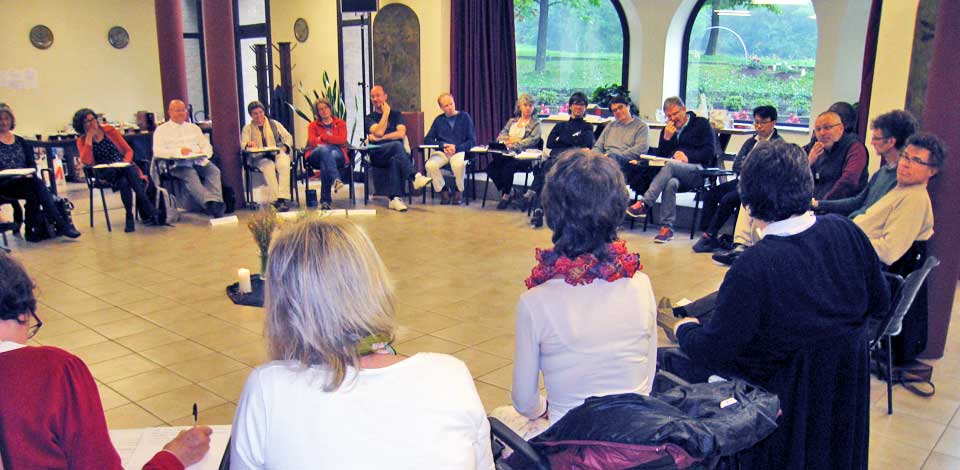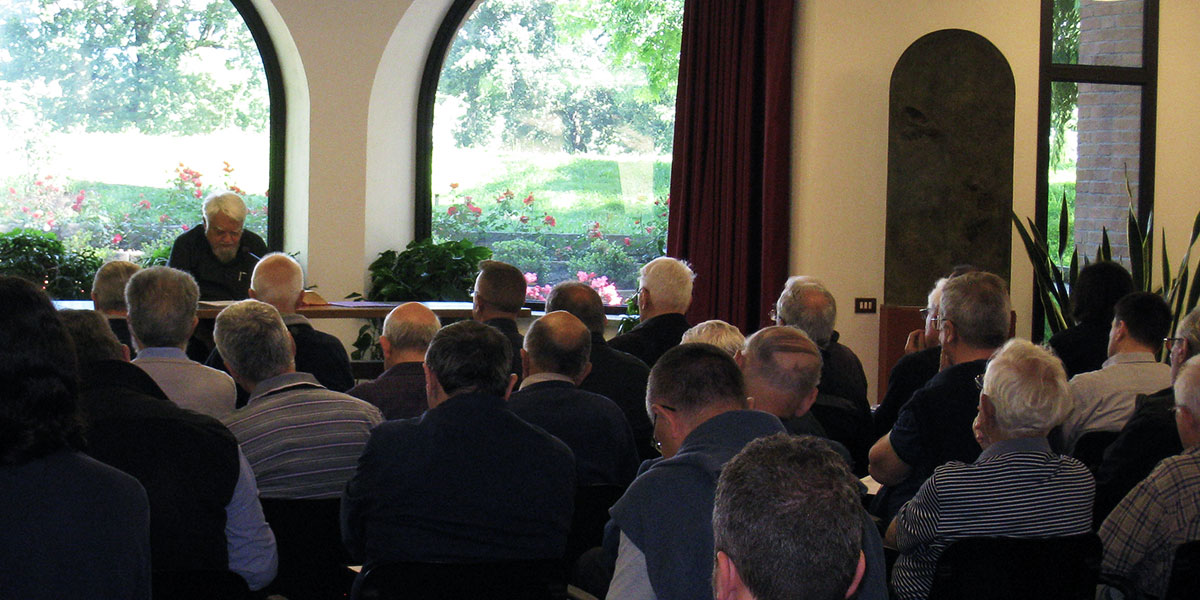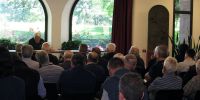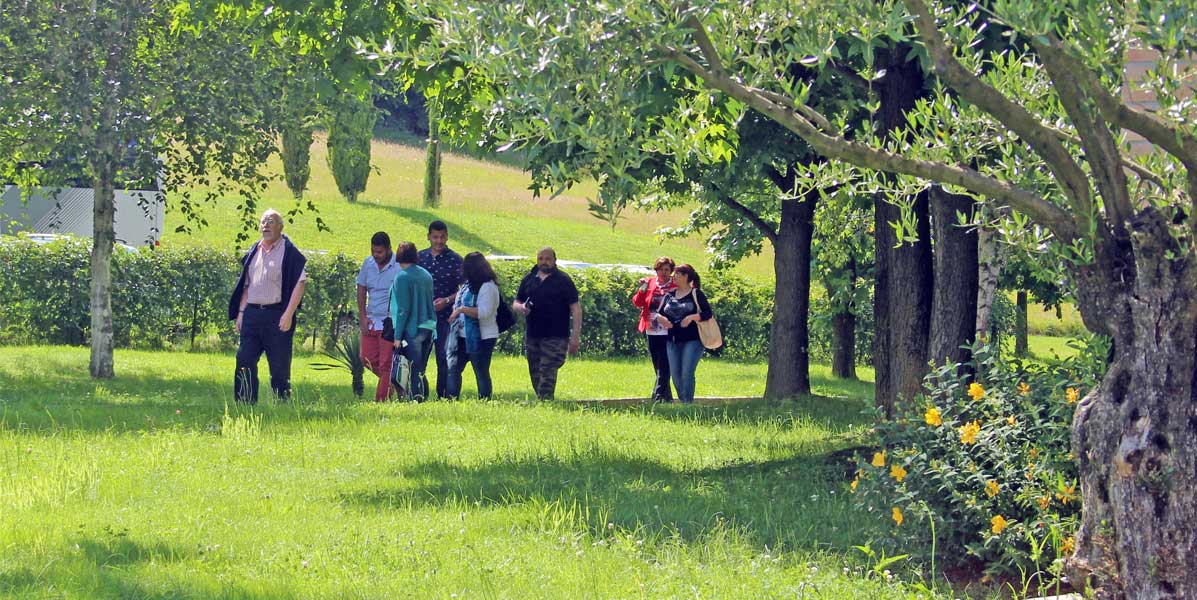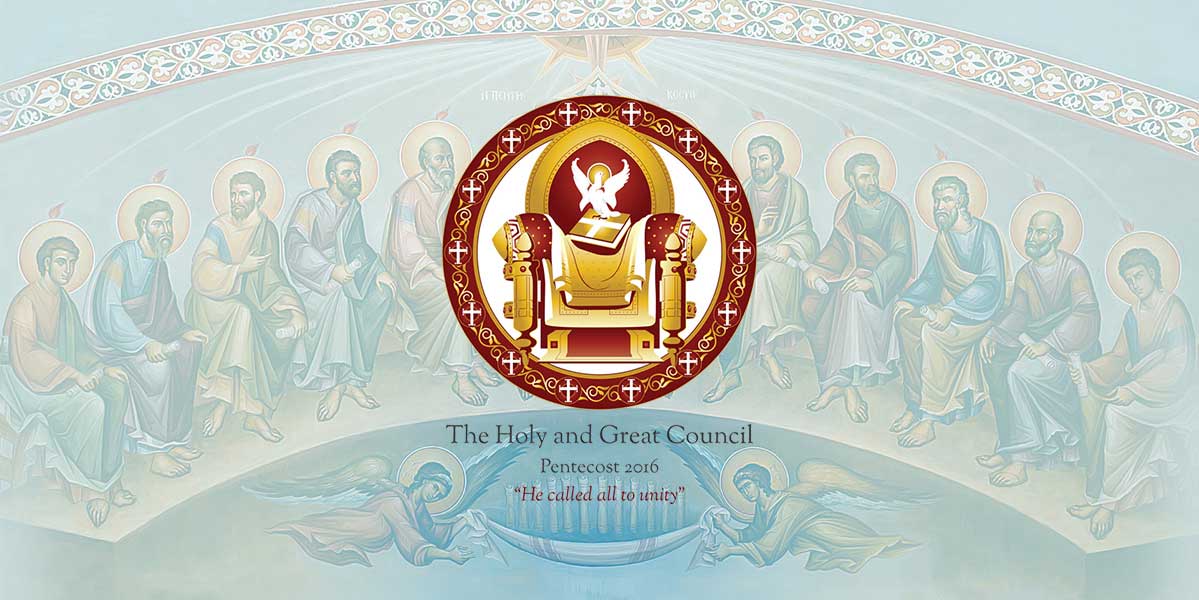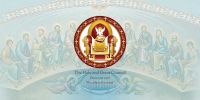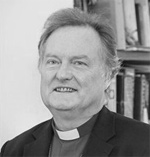Risultati (1921)
Pastori e diaconi svizzeri e francesi imparano la lectio divina a Bose
Wednesday 08 May 2024, at 19:58
June 2023
Wednesday 08 May 2024, at 19:58
Foto e sintesi dei lavori del 2 Giugno
Wednesday 08 May 2024, at 19:58
Storie d'amore 3 - Chiara Giaccardi e Enzo Bianchi
Wednesday 08 May 2024, at 19:58
Foto e sintesi dei lavori del 3 Giugno
Wednesday 08 May 2024, at 19:58
Settimana di esercizi per presbiteri: un percorso biblico sulla misericordia
Wednesday 08 May 2024, at 19:58
RASSEGNA STAMPA
Wednesday 08 May 2024, at 19:58
Anche la chiesa diventa "interconnessa"
Avvenire5 giugno 2016di LEONARDO SERVADIOSulla pelle della chiesa
Avvenire4 giugno 2016di LEONARDO SERVADIOLa questione cru...
Due parrocchie sorelle di Torino
Wednesday 08 May 2024, at 19:58
Foto e sintesi dei lavori del 4 Giugno
Wednesday 08 May 2024, at 19:58
Per vincere la paura: alimentare la speranza - Silvia Vegetti Finzi
Wednesday 08 May 2024, at 19:58
Viste da fuori: con gli occhi dell’altro
Wednesday 08 May 2024, at 19:58
La pelle delle chiese che fa riflettere sugli spazi comunitari
Wednesday 08 May 2024, at 19:58
July 2023
Wednesday 08 May 2024, at 19:58
Concilio della Chiesa Ortodossa
Wednesday 08 May 2024, at 19:58
Gesù, il volto della misericordia del Padre
Wednesday 08 May 2024, at 19:58
There was a problem loading image 'images/ospitalita/settimane/15_08_24_breton_preghiera.jpg'
There was a problem loading image 'images/ospitalita/settimane/15_08_24_breton_preghiera.jpg'
a cura di Ludwig Montidall'11 al 16 luglio 2016
Gesù è venuto a rivelare pienamente e definitivamente Dio e la sua misericordia, attraverso la sua vita umana fatta di azioni e di parole. ...Archivio settimane bibliche
Wednesday 08 May 2024, at 19:58
There was a problem loading image 'images/ospitalita/settimane/001_16_08_01_jodice_umano.jpg'
There was a problem loading image 'images/ospitalita/settimane/001_16_08_01_jodice_umano.jpg'
There was a problem loading image 'images/preghiera/vangelo/16_05_18_el_greco_trinita_prado.jpg'
There was a problem loading image 'images/preghiera/vangelo/16_05_18_el_greco_trinita_prado.jpg'
There was a problem loading image 'images/preghiera/vangelo/14_11_19_cristo_re_el_greco.jpg'
There was a problem loading image 'images/preghiera/vangelo/14_11_19_cristo_re_el_greco.jpg'
There was a problem loading image 'images/preghiera/vangelo/16_07_18_el_greco-visione_giovanni.jpg'
There was a problem loading image 'images/preghiera/vangelo/16_07_18_el_greco-visione_giovanni.jpg'
There was a problem loading image 'images/ospitalita/settimane/15_08_24_breton_preghiera.jpg'
There was a problem loading image 'images/ospitalita/settimane/15_08_24_breton_preghiera.jpg'
There was a problem loading image 'images/ospitalita/settimane/15_08_11_breugel_ciechi.jpg'
There was a problem loading image 'images/ospitalita/settimane/15_08_11_breugel_ciechi.jpg'
There was a problem loading image 'images/ospitalita/settimane/15_08_03_preghiere_eucaristiche.jpg'
There was a problem loading image 'images/ospitalita/settimane/15_08_03_preghiere_eucaristiche.jpg'
Settimane bibliche 2017
Annunciazioni
dall'8 al 10 dicembre 2017
a cura di Daniel Attinger, monaco di Bose
Alcuni giorni per sostare sulla parola e gustare il silenzio
Read more ...La vita interiore oggi: settimana biblica di Enzo Bianchi e Goffredo Boselli
Settimane bibliche e di spiritualità
I temi maggiori della vita interiore al giorno d’oggi sono stati al centro degli incontri tenuti a Bose, da lunedì 14 a sabato 19 agosto, dal fondatore fr. Enzo Bianchi e da fr. Goffredo Boselli. La riflessione proposta dai due monaci alla novantina di ospiti presenti, provenienti da varie parti d’Italia, è nata dalla constatazione che oggi la vita interiore crea difficoltà e non appare come una delle urgenze della vita cristiana. Vivere la vita spirituale cristiana chiede anzitutto di riscoprire gli elementi essenziali e comuni a ogni vita interiore, nella consapevolezza che non può esserci vita spirituale là dove non c’è vita interiore.
Read more ...Spirito Santo e discernimento: settimana biblica di Enzo Bianchi
Settimane bibliche e di spiritualità
Fr. Enzo ha sottolineato fin dall’inizio del corso l’importanza di questo tema non solo per la comprensione e l’interpretazione delle Scritture, ma anche e soprattutto per la sua centralità e attualità nella vita della chiesa; la riflessione sul tema dello Spirito Santo infatti conduce a interrogarsi sul delicato e fondamentale equilibrio nella chiesa tra carisma e istituzione.
Read more ...
Rosanna Virgili - Maternità e paternità nella Bibbia
Settimane bibliche e di spiritualità
A partire dall’attualità, per inoltrarsi poi nelle pagine del canone biblico, Rosanna Virgili, biblista presso l’Istituto Teologico Marchigiano, ha affrontato, nel corso biblico tenutosi a Bose nella settimana dal 31 luglio al 5 agosto, il tema della maternità e della paternità nella Bibbia.
Read more ...
Massimo Grilli - Il vangelo di Matteo
Settimane bibliche e di spiritualità
Sabato 22 luglio si è concluso il corso di spiritualità dedicato alla meditazione del vangelo secondo Matteo, accompagnato dal professor Massimo Grilli, presbitero della diocesi di Palestrina e docente di Nuovo Testamento alla Pontificia Università Gregoriana.
Read more ...Settimane bibliche 2016
Enzo Bianchi - La cattedra dei poveri e dei sofferenti
a cura di Enzo Bianchi
dal 16 al 20 agosto 2016
Ascolta il primo intervento:
Si è concluso il corso tenuto dal priore, Enzo Bianchi, dal titolo La cattedra dei poveri e dei sofferenti.
I poveri e i sofferenti non vanno solo compatiti e aiutati ma prima di tutto ascoltati perché titolari di un magistero, di un insegnamento per noi. Questa l’idea chiave sviluppata da Enzo grazie ad un’itinerario attraverso l’intero testo biblico. I testi profetici e legislativi dell’Antico Testamento dipingono il povero con i volti più disparati, dagli orfani e le vedove, agli stranieri, agi schiavi, ai malati. Figure diverse, ma tutte accomunate dalla consapevolezza di un bisogno che solo Dio può colmare. Sono questi poveri ad insegnare a Israele ad attendere il Messia, il re giusto e liberatore.
Ma l’Antico Testamento rivela anche un Dio che è dalla parte de poveri, che ascolta il loro grido anche quando non ha voce e che li ama più di ogni altro. È questo stesso Dio che nel Nuovo Testamento, in Gesù, si fa povero, fino ad assumere la condizione di schiavo (cfr. Fil 2,5-9). Gesù è passato facendo del bene e guarendo (cfr. At 10,38), ma soprattutto i poveri li ha incontrati, li ha ascoltati e toccati, si è messo alla scuola del loro magistero di umanità. A noi è chiesto di seguirne le tracce, perché è la comunione il cuore del cristianesimo.
Acquista tutto il corso:
Enzo Bianchi, Cosa è Vangelo? Cosa è buona notizia?
a cura di Enzo Bianchi
dall'8 al 13 agosto 2016
Se Vangelo significa “buona notizia”, qual è questa buona notizia? Incompreso, mal interpretato quando non addirittura falsato nel corso della storia, il Vangelo ha una sua essenza profonda, rintracciabile sin dalle prime pagine dell’Antico Testamento. Vangelo non indica soltanto il genere letterario del Nuovo Testamento che raccoglie la vita e le parole di Gesù di Nazareth ma, prima di tutto, Cristo stesso che resta il centro della fede cristiana. Ma Vangelo è anche la “buona notizia” che è contenuta in tutte le Scritture.
Tracciando un percorso scritturistico che va dall’Esodo all’epistolario paolino, il priore di Bose ha mostrato al centinaio di ospiti convenuti il cuore di questo messaggio biblico, mettendo in evidenza la continuità e anche la rottura tra le due alleanze. La “buona notizia” rivelata da Gesù Cristo, il Cristo stesso, esiste in nuce già nell’Antico Testamento.
Per fr. Enzo, il cuore della Torah per noi cristiani non è già la Legge ma l’autorivelazione di Dio fatta a Mosè sul monte Sinai (cf. Es 3,14; 34,5-7). Lì il Signore, svelando il suo nome, cioè la sua identità profonda, si rivela come misericordia. Ecco la “buona notizia” che fa da criterio ermeneutico dell’evangelicità dell’Antico Testamento. E lungo tutto il corso della prima alleanza la buona notizia è che la misericordia di Dio ha sempre la meglio sulla sua giustizia.
Nel Nuovo Testamento la “buona notizia” è la vita di Gesù: egli è l’inveramento della misericordia di Dio annunciata nel Primo Testamento. Gesù annuncia e realizza il perdono dei peccati. Egli si mette dalla parte dei peccatori, anzi va alla ricerca di chi soffre per il peccato, mangia con loro amandoli e trasformando le loro vite. Per questo il Vangelo diventa scandalo per gli uomini religiosi: colui che è santo e senza peccato si mescola con i peccatori. Lo stesso pentimento, nel Nuovo Testamento, diventa allora la conseguenza e non la premessa dell’amore di Dio.
Per i cristiani, fede non significa credere in Dio ma che Dio ci ama. Ed ecco l’ultimo sviluppo della buona notizia come amore divino, che sottolinea l’apostolo Paolo: la giustizia di Dio è, in realtà, giustificazione; in Cristo, Dio fa giusti i peccatori.
Maschile e femminile nella Bibbia - Rosanna Virgili
 a cura di Rosanna Virgili
a cura di Rosanna Virgili
dal 1 al 5 agosto 2016
L'uomo e la donna entrambi creati per stare l'uno di fronte all'altra, per essere una il limite dell'altro, rischiano nella vita e nella storia, anche in quella biblica, di essere invece l'uno contro l'altra.
Rosanna Virgili, biblista presso l’Istituto Teologico Marchigiano, ha guidato l’ottantina di ospiti presenti a Bose questa settimana in un percorso attraverso le storie degli uomini e delle donne dell'Antico Testamento e del Nuovo Testamento. Caino, Abele, Abramo, Sara, Mosè, Davide, Debora, Ruth e Noemi, Pietro,e Maria Maddalena: attraverso il racconto esegetico delle loro vicende umanissime, la Virgili ha cercato di dare significato concreto ai concetti di maschile e femminile, sempre tenendo presente la distinzione tra l'antropologia culturale che definisce gli usi e i costumi e quindi anche i rapporti tra uomini e donne di una data cultura e periodo storico, e l'antropologia teologica che invece rivela nel tessuto della narrazione biblica un impianto etico che pone al centro la relazione.
Il rispetto del limite dell'altro, della differenza, il riconoscimento all'interno della relazione di una trascendenza che impedisce di impadronirsi dell'altro sono ciò che permette di restare nell'alleanza e di non cadere nell'idolatria. Da ultimo la biblista ha mostrato come all'interno del paradigma del maschile e del femminile compreso come paradigma della differenza, della scoperta del proprio limite e della propria non autosufficienza, è possibile leggere la storia dell'alleanza tra Dio e il suo popolo, storia fatta di alterità, di tradimenti, di abbandoni, di perdono e di continue riprese.
Vivere umanamente. Riscoprire una grammatica dell’umano
 a cura di Luciano Manicardi
a cura di Luciano Manicardi
dal 25 al 30 luglio 2016
Dovremmo imparare a considerarci ospiti dell’umano che è in noi. Ospiti, non padroni. Così potremmo imparare anche ad aver cura dell’umano che è in noi e ad essere solleciti anche verso l’umano sofferente che è nell’altro. L’umano che è in noi è il luogo della nostra immagine e somiglianza con Dio, che ha rivelato il suo volto nell’umanità di Gesù.
1. Una fede umana. Una grammatica dell’umano
2. L’ambivalenza dell’umano
3. La polarità umano/inumano. Il disprezzo e la vergogna
4. La morte e il morire
5. Il comunicare. La parola
6. Vivere il tempo
7. Vivere il quotidiano
8. Corporeità, amore, sessualità
9. Il corpo sofferente. Vivere la malattia
Abramo: Dio insegna al credente a camminare
 a cura di André Wénin
a cura di André Wénin
dal 27 giugno al 2 luglio 2016
Sabato mattina si è concluso il corso biblico a cura di André Wenin dal titolo “Abramo insegna al credente a camminare.”
André Wénin è docente di Antico Testamento alla Facoltà teologica di Louvain-la-Neuve (Belgio) e professore invitato alla Pontificia università Gregoriana di Roma. Amico fraterno della nostra comunità da lunghi anni viene spesso a Bose come insegnante a condividere la sua passione per le Scritture e per gli intrecci dei racconti che contengono.
Wenin ha proposto all’ottantina di ospiti presenti questa settimana un’appassionante lettura della figura di Abramo secondo un percorso narrativo che si apre in Genesi alla fine dell’undicesimo capitolo per concludersi al capitolo 25.
Il professore stesso si è definito come “una guida turistica” che ha accompagnato i suoi ascoltatori all’interno di questo monumento letterario e documento storico che è la storia di Abramo e della sua famiglia.
Il biblista ha focalizzato la sua attenzione sull’evolversi della relazione tra Abramo e il suo Dio, Abramo e la sua donna Sara, Abramo e “tutte le genti della terra”. La consapevolezza di essere il portavoce della benedizione di Dio cresce all’interno di una storia (che è poi quella di ciascuno di noi) di lotta tra la bramosia del possesso e la libertà di chi accetta la vita come dono e impara ad affidarsi a quel Dio che mantiene le sue promesse.
Con questa avventurosa storia fatta di inganni, promesse, delusioni e sorprese che rappresentano il complesso fenomeno umano, davvero “Abramo insegna al credente a camminare”.
Gesù, il volto della misericordia del Padre
 a cura di Ludwig Monti
a cura di Ludwig Monti
dall'11 al 16 luglio 2016
Gesù è venuto a rivelare pienamente e definitivamente Dio e la sua misericordia, attraverso la sua vita umana fatta di azioni e di parole. Per comprendere la misericordia di Dio in verità, cioè secondo Gesù, non possiamo che riandare alle sue parole e ai suoi gesti, sgomberando il campo dalle nostre idee preconcette su Dio. Tutto ciò che Gesù ha detto e fatto per “raccontare Dio” (cf. Gv 1,18), siamo anche noi tenuti a dirlo, a farlo e a crederlo; ma tutto ciò che non ha detto e non ha fatto, anche noi dobbiamo rimuoverlo dalle nostre concezioni su Dio e dal nostro comportamento quotidiano.
“Fare misericordia”, come Gesù ci ha insegnato, è sempre raggiungere l’altro nella sua sofferenza, non guardarlo dall’alto con sentimenti buoni o di pietà. Perché la misericordia accade come evento evangelico solo nel faccia a faccia, nella prossimità, cioè quando accettiamo di rendere l’altro prossimo facendoci vicino a lui. Si tratta di donare all’altro la propria presenza: in questo senso, nessuno di noi può dire di non poter fare misericordia. Ed è questa la via per mettere in pratica lo straordinario compito affidatoci da Gesù: “Siate misericordiosi, come il Padre vostro è misericordioso” (Lc 6,36).
“Io sono”. Il Messia nel vangelo secondo Giovanni
 a cura di Daniel Attinger
a cura di Daniel Attinger
dal 4 al 9 luglio 2016
Le formule Io sono nel vangelo secondo Giovanni rivelano alcuni tratti dell’identità di Gesù e vanno comprese in tutta la loro forza. Gesù intende distinguersi dalle parziali o false offerte di luce, di pane, di vita, e insieme svelare all’uomo il senso profondo della sua propria ricerca della luce o del pane o dell’acqua o della vita. Queste parole risuonano come un appello per noi, che siamo chiamati a rispondervi con la nostra vita, facendo nostra l’affermazione di Paolo: “Non sono più io che vivo, ma Cristo che vive in me”.
TEMI DELLA SETTIMANA
1. “Io sono colui che sono” (Es 3,14)
2. “Io sono il Messia” (Gv 4,26)
3. “Io sono il pane di vita” (Gv 6,35)
4. “Io sono la luce del mondo” (Gv 8,12; 9,5)
5. “Io sono la porta” (Gv 10,7.9); “Io sono il buon pastore” (Gv 10,11.14)
6. Il processo intentato a Gesù. La venuta di Gesù come giudizio (Gv 7-12)
7. “Io sono la resurrezione e la vita” (Gv 11,25)
8. “Io sono la via, la verità e la vita” (Gv 14,6)
9. “Io sono la vera vite” (Gv 15,1). Excursus conclusivo su “Io sono” in Giovanni
Beati i poveri. Il messaggio biblico della povertà
 a cura di Giancarlo Bruni
a cura di Giancarlo Bruni
dal 27 giugno al 2 luglio 2016
L’uomo è costitutivamente povero perché riceve la vita da altri; noi siamo radicale dipendenza. Cosa si intende per povertà? È un bene da custodire o un male da eliminare? Possiamo dire una parola di Dio sulle tragiche situazioni umane? La povertà è una dimensione ricca di un ulteriore senso: è segno del passaggio di Dio nella storia e del suo progetto sulla storia. Cosa significa una chiesa povera, fatta di poveri e per i poveri?
TEMI DELLA SETTIMANA:
1. Le figure della povertà
2. Beati i poveri in spirito
3. Povertà e poveri nella Bibbia
4. La figura del povero nella Bibbia
5. La salmodia del povero
6. Gesù e la povertà (I)
7. Gesù e la povertà (II)
8. I poveri nelle prime comunità cristiane
9. Chiesa e povertà
Settimane bibliche 2015
La preghiera cristiana, una scuola di comunione
a cura dei fratelli e delle sorelle di Bose
dal 24 al 29 agosto
La preghiera cristiana, anche quando è personale, non è mai individuale, apre sempre a una comunione, è scuola di comunione: in essa si tratta di “lasciarsi disarmare” – come diceva il patriarca Athenagoras – di lasciarsi convertire dalle chiusure dei nostri egoismi al cuore dilatato “secondo la misura di Cristo”. La sfida è essenzialmente la stessa di quella dell’intera vita cristiana: lasciare agire lo Spirito in noi perché converta il nostro desiderio, per passare dalla pretesa di chiedere a Dio “Fa’ la mia volontà”, all’invocazione filiale “Sia fatta la tua volontà!”, che Gesù ha fatto propria in tutta la sua vita, fino alla morte, e non a caso egli ha posto al cuore e al centro della preghiera che ha insegnato ai suoi discepoli, il Padre nostro.
Programma della settimana
1. INTRODUZIONE GENERALE: Le caratteristiche della preghiera cristiana
2. PREGARE LA PAROLA: LA LECTIO DIVINA COME “MATRICE” E STRUTTURA FONDAMENTALE DELLA PREGHIERA CRISTIANA
3. I SALMI: LA PREGHIERA DEL POVERO
4. GESÙ MODELLO DI PREGHIERA NEI VANGELI
5. GESÙ MAESTRO DI PREGHIERA: IL “PADRE NOSTRO”
6. LE ESPRESSIONI DELLA PREGHIERA CRISTIANA (1): LA SUPPLICA, L’INVOCAZIONE DEL PERDONO, L’INTERCESSIONE
7. LE ESPRESSIONI DELLA PREGHIERA CRISTIANA (2): LA LODE E IL RINGRAZIAMENTO
8. PREGARE NELLA COMUNIONE DEL “CORPO DI CRISTO”: LA LITURGIA CRISTIANA E L’EUCARESTIA
9. CONCLUSIONE : “DIVENTARE PREGHIERA”, LA DIMENSIONE ESISTENZIALE DELLA PREGHIERA CRISTIANA
Le altre parabole di Gesù - Enzo Bianchi
 a cura di Enzo Bianchi
a cura di Enzo Bianchi
dal 10 al 15 agosto
Settimane bibliche e di spiritualità
Gesù osservava come iniziava il giorno; osservava ciò che accadeva in una casa, per strada e nelle piazze; si fermava a guardare i campi di grano e i prati con i loro fiori; si avvicinava agli alberi per scrutare le loro gemme, sempre più gonfie in primavera; sapeva prestare attenzione a come una donna fa il pane, a come un pastore guida il gregge e ne conta le pecore, a come i bambini giocano sulle strade, a come un contadino semina e miete… È impressionante questo sguardo umanissimo di Gesù sul quotidiano della vita degli uomini e delle donne. È proprio da queste “visioni pensate” che nascevano le sue parabole, storie semplici e quotidiane in cui troviamo la sua creatività, la sua narrazione più originale del Dio che nessuno ha mai visto né può vedere, ma che Gesù voleva spiegarci e raccontarci.
sintesi di Ludwig Monti
Le preghiere eucaristiche, fonte di vita spirituale
 a cura di a cura di Enzo Bianchi e Goffredo Boselli, monaco di Bose
a cura di a cura di Enzo Bianchi e Goffredo Boselli, monaco di Bose
dal 3 all' 8 agosto 2015
Da lunedì 3 a sabato 8 agosto si terrà una settimana di riflessione su un elemento fondamentale della liturgia: la Preghiera eucaristica. Momento centrale e culminante dell’intera celebrazione, la Preghiera eucaristica è il modello della preghiera cristiana che è azione di grazie, benedizione, lode, memoriale, intercessione. Dopo una breve introduzione sull’origine, la struttura e la dinamica dell’anafora, Enzo Bianchi e Goffredo Boselli commenteranno ciascuna delle quattro principali Preghiere eucaristiche del Messale romano. Questi importanti testi della liturgia, che restano ancora oggi poco conosciuti, contengono una ricchezza biblica e una profondità teologica capace di nutrire la vita spirituale dei credenti.
sintesi di Goffredo Boselli
I vizi capitali
a cura di Giovanni Cucci s.j., Pontificia Università Gregoriana
e Luciano Manicardi, monaco di Bose.
dal 27 luglio al 1 agosto
Il corso riprende la tradizione cristiana dei cosiddetti "vizi capitali" per operarne una rilettura interdisciplinare nell'oggi. La lista dei vizi capitali è una griglia che consente di leggere la persona, ma anche le sue relazioni interpersonali, sociali e politiche: essa dice qualcosa di profondo sull’essere umano e sul suo mondo. Parlando di vizi capitali noi parliamo di una possibilità dell’uomo. I vizi ci indicano, per via negativa, per contrasto, la via della nostra riuscita umana, ci indicano le vie grazie alle quali la nostra vita può essere bella e non degradata. Parlando di gola e lussuria, di invidia e avarizia, di collera, di accidia e di superbia verranno passati in rassegna il rapporto con il cibo e con la sessualità, con gli altri e con il denaro e le cose, con il tempo e con lo spazio, con la parola e con Dio. Rapporti vitali e delicati, passibili di distorsione, su cui dunque vigilare per viverli in maniera sempre più umanizzata.
sintesi di Luciano Manicardi
Acquista il CD oppure scarica gli mp3
Per terra e per mare. Il vangelo secondo Luca
 a cura di Rosanna Virgili, Istituto Teologico Marchigiano
a cura di Rosanna Virgili, Istituto Teologico Marchigiano
L’opera di Luca, ha esordito la professoressa Virgili alla prima lezione, è racconto della mitezza di Cristo, della determinazione, della misericordia, dei poveri, delle donne, dei viaggi “per terra e per mare”, in un continuo decentramento dal tempio alle periferie. Gli episodi che si sono commentati sono l'annuncio dell'angelo a Maria, la visita a Elisabetta, le tentazioni di Gesù nel deserto, la guarigione della donna curva da diciotto anni e dell'indemoniato che viveva a Gerasa tra i sepolcri, e ancora la parabola del povero Lazzaro... La parola di Gesù, radicata nel Dio delle Scritture, si compie e si fa vita nel grembo di una vergine e di un'anziana; dialoga, in maniera vincente e liberante, con le pulsioni della fame, del potere sugli altri, del potere religioso, smascherandone il pericolo di idolatria; ridona dignità, umanità e prossimità a chi vive ripiegato su se stesso, isolato e intimamente diviso. La parola di Gesù rimette nel giro della vita coloro che, in vari modi e per motivi diversi, erano relegati ai margini della società del tempo, e di ogni tempo.
sintesi di Chiara Pignocchi
Ascolta un passaggio del corso
Acquista il CD oppure scarica gli mp3
A causa di Cristo e del Vangelo. Una lettura del Vangelo secondo Marco
a cura di Ludwig Monti, monaco di Bose
“Chi vuole salvare la propria vita, la perderà; ma chi perderà la propria vita per causa mia e del Vangelo – cioè anche ‘per causa mia che sono il Vangelo, la buona e bella notizia per eccellenza’ –, la salverà” (Mc 8,35; cf. anche Mc 10,29), dice Gesù al centro del vangelo secondo Marco. Queste parole paradossali possono persino risuonare folli, assurde, soprattutto agli orecchi dei non cristiani. Come può un uomo pretendere questo? Eppure Gesù lo ha fatto, riassumendo così la peculiarità della vita con lui, ossia della vita cristiana. In proposito non c’è molto da commentare: c’è da sperimentare (e di conseguenza da capire) che il tenere gelosamente la vita per sé equivale a perderla, a gettarla via; il perderla per Cristo, dunque il vivere per amore suo con lui e come lui, cioè a favore dei nostri fratelli e sorelle in umanità, significa trovarla e vederla da lui salvata. La vita cristiana è molto semplice: è una vita umana conforme alla vita di Gesù Cristo, allo stile con cui egli ha vissuto, amato, dato e ricevuto fiducia.
Ludwig Monti
Un Dio che si implica nella nostra storia: una lettura della Genesi
 a cura di Daniel Attinger, monaco di Bose
a cura di Daniel Attinger, monaco di Bose
In un certo senso, si deve dire che la Genesi non è l’inizio della Bibbia. L’inizio si trova negli eventi dell’esodo, quando Israele fece la conoscenza di Colui che divenne il suo Dio, il SIGNORE. La Genesi è un tentativo di raccontare Dio, in ciò che faceva prima di farsi conoscere a Israele. Ricuperando storie ancestrali di patriarchi, storie di clan e di tribù, che si raccontavano sotto le tende, e rileggendo i miti delle civilizzazioni circonstanti, Israele ha mostrato nella narrazione delle generazioni che compongono la Genesi, che il suo Dio, Dio di amore e di liberazione, si è manifestato tale fin dalle origini della storia umana e nelle varie vicende – anche tumultuose – della storia degli uomini. Nel contempo forgiava l’unità dello stesso popolo d’Israele.
Daniel Attinger
Acquista il CD oppure scarica gli mp3
Beati i pacifici
 a cura di Giancarlo Bruni, monaco di Bose
a cura di Giancarlo Bruni, monaco di Bose
«Dio è violento, sì o no? Le religioni, e il monoteismo ebraico-cristiano-islamico in particolare, sono fonte di pace, sono riserva critica nei confronti della cultura della violenza o sono motivo e giustificazione dei conflitti? L’attualità rende urgente, come sempre d’altronde, il chiedersi in rigorosità e verità di quali immagini di Dio si è portatori. Il che richiede, tra l’altro, un ritorno ai propri testi fondativi a coglierne il messaggio fontale, costitutivo ed essenziale, alla cui luce reinterpretare gesti e parole di violenza in nome del proprio Dio. Un Dio, e il riferimento è all’esperienza biblica, in principio pastore e guerriero, quindi smascheratore dell’origine da cui muove la violenza, il cuore dell’uomo, poi identificato dalle figure del Messia di pace e del Servo del Signore. Una breccia aperta che “Gesù verrà ad occupare” portando, nella versione cristiana, a compimento l’immagine di un Dio che si spezza senza spezzare nessuno, che si dà in pasto senza fagocitare nessuno, che non priva nessuno del suo sguardo di fiducia, di speranza e di amore. Per una storia altra, determinata dal guardare come si è guardati, un Dio non lupo prepotente, non volpe astuta, ma agnello mite e umile.»
Giancarlo Bruni
Acquista il CD oppure scarica gli mp3
“Io sono”. Il Messia nel vangelo secondo Giovanni
Wednesday 08 May 2024, at 19:58
There was a problem loading image 'images/ospitalita/settimane/15_08_24_breton_preghiera.jpg'
There was a problem loading image 'images/ospitalita/settimane/15_08_24_breton_preghiera.jpg'
a cura di Daniel Attingerdal 4 al 9 luglio 2016
Le formule Io sono nel vangelo secondo Giovanni rivelano alcuni tratti dell’identità di Gesù e vanno comprese in tutta la loro forza. Gesù ...Beati i poveri. Il messaggio biblico della povertà
Wednesday 08 May 2024, at 19:58
There was a problem loading image 'images/ospitalita/settimane/15_08_24_breton_preghiera.jpg'
There was a problem loading image 'images/ospitalita/settimane/15_08_24_breton_preghiera.jpg'
a cura di Giancarlo Brunidal 27 giugno al 2 luglio 2016
L’uomo è costitutivamente povero perché riceve la vita da altri; noi siamo radicale dipendenza. Cosa si intende per povertà? È un b...Donazione
Wednesday 08 May 2024, at 19:58
Grazie
per aver effettuato una donazione al nostro Monastero. Il tuo contributo ci sarà utile per perseguire le nostre attivit...
Abramo: Dio insegna al credente a camminare
Wednesday 08 May 2024, at 19:58
a cura di André Wénindal 27 giugno al 2 luglio 2016
Sabato mattina si è concluso il corso biblico a cura di André Wenin dal titolo “Abramo insegna al credente a camminare.” André Wénin è...August 2023
Wednesday 08 May 2024, at 19:58
Vivere umanamente. Riscoprire una grammatica dell’umano
Wednesday 08 May 2024, at 19:58
a cura di Luciano Manicardidal 25 al 30 luglio 2016
Dovremmo imparare a considerarci ospiti dell’umano che è in noi. Ospiti, non padroni. Così potremmo imparare anche ad aver cura dell’um...Kirill Kaleda
Wednesday 08 May 2024, at 19:58
+ John X Patriach of Antioch
Wednesday 08 May 2024, at 19:58
Lidya Golovkova
Wednesday 08 May 2024, at 19:58
+ Job of Telmessos
Wednesday 08 May 2024, at 19:58
Panteleimon Manoussakis
Wednesday 08 May 2024, at 19:58
Luigi d’Ayala Valva
Wednesday 08 May 2024, at 19:58
Ekaterini Tsalampouni
Wednesday 08 May 2024, at 19:58
Speakers - Abstracts
Wednesday 08 May 2024, at 19:58
+ John X Patriach of Antioch
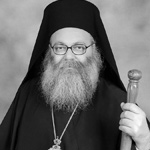 His Beatitude PatriarchJohn X (Yazigi), Patriarch of Antioch and All the Eastis the primate of the Greek Orthodox Church of Antioch. Prior to his election as patriarch on December 17, 2012, he led the Antiochian Orthodox Archdiocese of Europe headquartered in Paris, France. Before his election and enthronement as Metropolitan, he had been titular bishop of Pyrgou (al-Hosn), Syria. He was also formerly the dean of the St. John of Damascus Institute of Theology (Tripoli, Lebanon), the patriarchal seminary attached to the University of Balamand. His Beatitude has a Degree in Theology from the Balamand seminary (1978), a Diploma in Byzantine Music from the Byzantine Music Conservatory in Thessalonica (1981), and a Ph.D. in Theology with a specialization in Liturgics from the University of Thessalonica (1983). While at the Balamand, he served as Professor of Liturgics (1981-2008), as well as in the abbacy of St. George Al-Humayrah Patriarchal Monastery (1993-2005) and the Monastery of Our Lady of Balamand (2001-2005). Since April 2013 his brother, Paul the Metropolitan of Aleppo was kidnapped together with Youhanna Ibrahim, Metropolitan of Aleppo of the Syrian Orthodox Church.His Beatitude is also the author of numerous books and articles on Orthodox theology and liturgics.
His Beatitude PatriarchJohn X (Yazigi), Patriarch of Antioch and All the Eastis the primate of the Greek Orthodox Church of Antioch. Prior to his election as patriarch on December 17, 2012, he led the Antiochian Orthodox Archdiocese of Europe headquartered in Paris, France. Before his election and enthronement as Metropolitan, he had been titular bishop of Pyrgou (al-Hosn), Syria. He was also formerly the dean of the St. John of Damascus Institute of Theology (Tripoli, Lebanon), the patriarchal seminary attached to the University of Balamand. His Beatitude has a Degree in Theology from the Balamand seminary (1978), a Diploma in Byzantine Music from the Byzantine Music Conservatory in Thessalonica (1981), and a Ph.D. in Theology with a specialization in Liturgics from the University of Thessalonica (1983). While at the Balamand, he served as Professor of Liturgics (1981-2008), as well as in the abbacy of St. George Al-Humayrah Patriarchal Monastery (1993-2005) and the Monastery of Our Lady of Balamand (2001-2005). Since April 2013 his brother, Paul the Metropolitan of Aleppo was kidnapped together with Youhanna Ibrahim, Metropolitan of Aleppo of the Syrian Orthodox Church.His Beatitude is also the author of numerous books and articles on Orthodox theology and liturgics.
+ Job of Telmessos
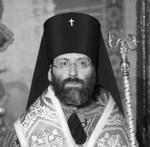 Archbishop Job of Telmessos (Ihor Getcha) was born in Montreal,Canada (1974) in a family a family of Ukrainian émigrés and educated at Collège Français (Montreal) and the University of Manitoba (Winnipeg). He studied theology at St. Andrew's College (Manitoba) and the St. Sergius Orthodox Theological Institute (Paris) from which he was awarded a doctorate, jointly with the Institut Catholique de Paris, in 2003, with a thesis on "The liturgical reform of Metropolitan Cyprian of Kiev". He was ordained priest by Archbishop Gabriel of Comane in 2003. On January 9, 2004, he was raised to hegumen, and on July 18 the same year, to archimandrite. He has worked as a lecturer and professor of church history, liturgy and canon law at various academic institutions including St Sergius, of which he was dean from 2005 to 2007, the Institut Catholique, theUniversity of Fribourgand, since 2009, the Orthodox Center of the Ecumenical Patriarchate in Chambesy,Switzerland. In November 2013 he was elected to lead the Patriarchal Exarchate for Orthodox Parishes of Russian Tradition in Western Europe; on 28 November 2015 the Holy Synod of the Ecumenical Patriarchate appointed him as the Patriarchate's representative to the World Council of Churches at Geneva. He has published Le Typikon décripté. Manuel de théologie byzantine (Paris, Cerf 2009), translated in English in 2012 (St Vladimir’s Seminary Press, New York) with the title: The Typikon Decoded.
Archbishop Job of Telmessos (Ihor Getcha) was born in Montreal,Canada (1974) in a family a family of Ukrainian émigrés and educated at Collège Français (Montreal) and the University of Manitoba (Winnipeg). He studied theology at St. Andrew's College (Manitoba) and the St. Sergius Orthodox Theological Institute (Paris) from which he was awarded a doctorate, jointly with the Institut Catholique de Paris, in 2003, with a thesis on "The liturgical reform of Metropolitan Cyprian of Kiev". He was ordained priest by Archbishop Gabriel of Comane in 2003. On January 9, 2004, he was raised to hegumen, and on July 18 the same year, to archimandrite. He has worked as a lecturer and professor of church history, liturgy and canon law at various academic institutions including St Sergius, of which he was dean from 2005 to 2007, the Institut Catholique, theUniversity of Fribourgand, since 2009, the Orthodox Center of the Ecumenical Patriarchate in Chambesy,Switzerland. In November 2013 he was elected to lead the Patriarchal Exarchate for Orthodox Parishes of Russian Tradition in Western Europe; on 28 November 2015 the Holy Synod of the Ecumenical Patriarchate appointed him as the Patriarchate's representative to the World Council of Churches at Geneva. He has published Le Typikon décripté. Manuel de théologie byzantine (Paris, Cerf 2009), translated in English in 2012 (St Vladimir’s Seminary Press, New York) with the title: The Typikon Decoded.
Panteleimon Manoussakis
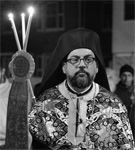 John Panteleimon Manoussakis was born in Athens, Greece, and educated in the United States (Ph.D.,Boston College). He was ordained into the diaconate in 1995 and into the priesthood in 2011, receiving the distinction of an archimandrite. He is a Honorary Fellow of the Faculty of Theology and Philosophy at the Australian Catholic University and he is the recipient of a Templeton Foundation grant. His research interests are in Philosophy of Religion, in Phenomenology (in particular Heidegger and Marion), in Ancient Greek Philosophy (especially Plato and the Neo-Platonic Tradition), in Patristics, and in Psychoanalysis. He is currently associate professor of Philosophy in the College of the Holy Cross (Worcester, Massachusetts), and the author of three books: God After Metaphysics: A Theological Aesthetic (Indiana University Press, 2007), Theos Philosophoumenos (Ellinika Grammata, 2004) and For the Unity of All: Contributions to the Theological Dialogue Between East and West (Eugene, OR: Cascade Books, 2015, to be published soon - september 2016 - in Italian by the Edizioni Qiqajon – Comunità di Bose). He also edited collective volumes and numerous articles in English, Greek, Russian, Serbian, and Ukrainian.
John Panteleimon Manoussakis was born in Athens, Greece, and educated in the United States (Ph.D.,Boston College). He was ordained into the diaconate in 1995 and into the priesthood in 2011, receiving the distinction of an archimandrite. He is a Honorary Fellow of the Faculty of Theology and Philosophy at the Australian Catholic University and he is the recipient of a Templeton Foundation grant. His research interests are in Philosophy of Religion, in Phenomenology (in particular Heidegger and Marion), in Ancient Greek Philosophy (especially Plato and the Neo-Platonic Tradition), in Patristics, and in Psychoanalysis. He is currently associate professor of Philosophy in the College of the Holy Cross (Worcester, Massachusetts), and the author of three books: God After Metaphysics: A Theological Aesthetic (Indiana University Press, 2007), Theos Philosophoumenos (Ellinika Grammata, 2004) and For the Unity of All: Contributions to the Theological Dialogue Between East and West (Eugene, OR: Cascade Books, 2015, to be published soon - september 2016 - in Italian by the Edizioni Qiqajon – Comunità di Bose). He also edited collective volumes and numerous articles in English, Greek, Russian, Serbian, and Ukrainian.
The Spirit as Source and Support of the One Christian Witness
"The Spirit as Source and Support of the One Christian Witness" explores the role of the Holy Spirit in bringing about and in sustaining the one witness to Gospel by all Christians. Emphasis will be placed on the understanding ofmartyriaasconfession/ ὁμολογία (with particular hermeneutical reading to such scriptural passages as Matthew 10:20 and 1 Corinthians 12:3).
Ekaterini Tsalampouni
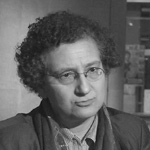 Ekaterini Tsalampouni is an Assistant Professor of the New Testament at theSchool of Social and Pastoral Theology at the Faculty of Theology of the Aristotle University of Thessaloniki. She received her PhD in New Testament from the Faculty of Theology of the AUTH in 1999, after which she worked as an assistant lecturer at the Institute of Orthodox Theology at Ludwig‐Maximillian University of Munich, Germany (2006‐2009) and as a lecturer at the School of Social and Pastoral Theology at the Faculty of Theology of the Aristotle University. She is a member of several societies, like the Society of Biblical Literature, the European Association of Biblical Studies, the European Society of Women in Theological Research, the Colloquium Oecumenicum Paulinum, and the Hellenic Bible Society. She has served as the treasurer of the European Association of Biblical Studies and the Vice Presidentof the European Society of Women in Theological Research. She is also a member of the Board of the Volos Academy of Theological Studies. Some of her publication sare Macedonia in New Testament Times (2000), Ecological Interpretation of the New Testament (2013), Exegetical Studies (2013) and she has also published several exegetical studies as well as studies on ecological hermeneutics and on the Graeco-Roman background of the New Testament.
Ekaterini Tsalampouni is an Assistant Professor of the New Testament at theSchool of Social and Pastoral Theology at the Faculty of Theology of the Aristotle University of Thessaloniki. She received her PhD in New Testament from the Faculty of Theology of the AUTH in 1999, after which she worked as an assistant lecturer at the Institute of Orthodox Theology at Ludwig‐Maximillian University of Munich, Germany (2006‐2009) and as a lecturer at the School of Social and Pastoral Theology at the Faculty of Theology of the Aristotle University. She is a member of several societies, like the Society of Biblical Literature, the European Association of Biblical Studies, the European Society of Women in Theological Research, the Colloquium Oecumenicum Paulinum, and the Hellenic Bible Society. She has served as the treasurer of the European Association of Biblical Studies and the Vice Presidentof the European Society of Women in Theological Research. She is also a member of the Board of the Volos Academy of Theological Studies. Some of her publication sare Macedonia in New Testament Times (2000), Ecological Interpretation of the New Testament (2013), Exegetical Studies (2013) and she has also published several exegetical studies as well as studies on ecological hermeneutics and on the Graeco-Roman background of the New Testament.
«Blessed are you when people persecute you on my account» (Mt 5,11).
Jesus’ Sayings about Persecution
In the first part of the paper, Jesus’ sayings about persecution and martyrdom, especially in the synoptic gospels, will be presented. The exegetical discussion will focus on tracing the early Christian tradition of martyrdom that is founded upon the dominical sayings and reflects the social situation in the early Christian communities that preserved it. Its theological implications, as well as its relation to the eschatological reality of the Kingdom of God, will be investigated in the second part of the paper. Consequently, the reception and adaptation of this tradition in the context of early Christian discourse on martyrdom will be briefly discussed. Finally, conclusions will be drawn regarding the theological significance of this tradition as well as its relevance to contemporary Christianity.
Georgij. E. Zakharov
Georgij. E. Zakharov(Moscow 1986) studied at the Orthodox University of St Tikhon and at the Institute of History of the Russian Academy of Sciences; his dissertation was on the “The Church in the social system of the Balkan-Danubian region in the fourth and fifth system”. Since 2007 he has been teaching history of the Church and patrology at the Orthodox University ofSt Tikhon. He is among the editors of the Russian edition of the complete works of St Ambrose of Milan and is studying the relations between the Roman See ad the Eastern Churches in the time of the Arian controversies, on which he has written two books.
“We are All One in Christ”. Martyrdom and the Unity of the Church in St Ambrose and the Latin Fathers in the Fourth Century
In the context of rapid changes in the relations between church and state after Constantine’s conversion and of the Arian crisis, which threatened catholic unity at all levels of church life, the theme of martyrdom acquires a special significance. The paper examines three types of “martyrdom narrative” in the Latin tradition, in authors such as Ambrose of Milan, Lucifer of Cagliari, Hilary of Poitiers, pope Liberius, and pope Damasus, Nicetas of Remesiana: 1) interpretation of martyrdom as a witness of faith; 2) imitation of martyrs as a form of spiritual ascesis; 3) martyrdom and the ideal of Rome’s renewal. At the end of the fourth century this narrative becomes part of a more universal and integral conception of the catholic Church as a communion in holy things and communion of saints (communion sanctorum). Such communion is not limited by social, ethnic, geographical, or temporal limits and manifests catholic unity always and everywhere.
Athanasios N. Papathanassiou
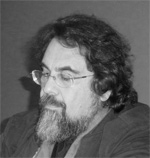 Athanasios N. Papathanassiou was born in Athens in 1959. He has a doctorate in theology and a degree in law. After a period of professional activity in law, he taught theology in secondary schools, primarily at the Zefyriou Lyceum in western Attica. In the years 2000–2008 he taught missiology, theology of the religions, and canon law at times at the Higher School of Theology in Athens and at the Higher Ecclesiastical Academy of Athens. Since the academic year 2008–20009 he has been teaching at the Hellenic Open University. He is chief editor of the prestigious theological review Synaxis and is a member of the European Society for Intercultural Theology and Interreligious Studies and of the editorial committee of the electronic review International Journal of Orthodox Theology. He has published studies on the encounter between Christianity and cultures, on the social activity of the Church, and on the dialogue of theology with the various currents of contemporary thought.
Athanasios N. Papathanassiou was born in Athens in 1959. He has a doctorate in theology and a degree in law. After a period of professional activity in law, he taught theology in secondary schools, primarily at the Zefyriou Lyceum in western Attica. In the years 2000–2008 he taught missiology, theology of the religions, and canon law at times at the Higher School of Theology in Athens and at the Higher Ecclesiastical Academy of Athens. Since the academic year 2008–20009 he has been teaching at the Hellenic Open University. He is chief editor of the prestigious theological review Synaxis and is a member of the European Society for Intercultural Theology and Interreligious Studies and of the editorial committee of the electronic review International Journal of Orthodox Theology. He has published studies on the encounter between Christianity and cultures, on the social activity of the Church, and on the dialogue of theology with the various currents of contemporary thought.
“I am the wheat of God” (St Ignatius of Antioch). Eucharistic and Communional Dimensions of Martyrdom
The Eucharist is an act of the Christian community: a meal at which the members of the community participate and from which are excluded those who do not belong to it. Nevertheless, in St Ignatius of Antioch we find a vision that opens the Eucharist. Martyrdom (an event that takes place in public space) transforms the Christian into Eucharistic bread, which is offered in the course of a “liturgy” celebrated in the open space of society. In addition, one form of martyrdom is also to suffer with history’s victims. Solidarity in founded on Christ’s incarnation and extend the confines of the community, making an ethical criterion (responsibility towards the other) as its basic characteristic.
+ Jeronim of Jegar
 Bishop Jeronim (Močević) of Jegar was born in Sarajevo on 26 September 1969.
Bishop Jeronim (Močević) of Jegar was born in Sarajevo on 26 September 1969.
He was tonsured in the monastery of Holy Archangels in Kovilj on 21st November 1990, ordained deacon on 27 January 1991, promoted as archdeacon on 26 July 1999. Archdeacon Jerome graduated at the Orthodox Theological Faculty in Belgrade in 2002, and the next year he was ordained as hieromonk.
As post-graduate student he spent several years at the Pontifical Oriental Institute in Rome, where he acquired the title of a Master of theology having made research into liturgical sciences. Metropolitan Jakovos of Mitilina promoted him into the rank of archimandrite in the church of St. Philothea in Smirna (Asia Minor), Turkey, in 2008.
It was in the monastery of Prophet Elias in the island Lesbos in Greece that Metropolitan Theolyptos promoted Fr. Jerome as spiritual father. At the time being he has been writing his doctoral thesis in the field of liturgical theology. He speaks Greek, Italian, French, Russian, German and English. At the regular session of the Holy Council of Bishops of the Serbian Orthodox Church on May 14, 2014 he was elected as Vicar Bishop of the Bishop of Backa Ireneus with the title Bishop of Jegar.
Fr Jerome will be consecrated as Bishop in the Cathedral church of St. George of Novi Sad on September 28, 2014. The sacrament of consecration will officiate His Holiness Serbian Patriarch Ireneus with several Hierarchs.
Andrew Louth
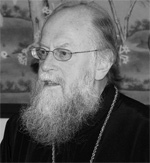 Andrew Louth isa priest of the Russian Orthodox Patriarchal Diocese of Sourozh since 2003 and serves a parish in Durham. His collegiate education was at the Universities of Cambridge and Edinburgh where he studied Mathematics and Theology and prepared his thesis which concerned Karl Barth. After graduation he taught early Christian theology and patristics in the University of Oxford and early Medieval and Byzantine history Goldsmiths College in the University of London. Fr. Louth has been Professor of Patristic and Byzantine Studies at Durham University since 1996. He teaches courses on the history and theology of the Christian Church: an undergraduate module dealing with the impact of the rise of Islam on mostly Greek Christianity in the eastern Mediterranean and a Master of Arts module on the understanding of what it is to be human in early Christian theology. His interests in research lie mostly in the history of theology in the Greek tradition, especially in Byzantine period. He is also interested in later periods including the modern period; that is the nineteenth century and later, where his research includes Russian and Romanian Orthodox theology. His interest in the theology of these periods is not purely historical, since he regards dialogue with the theological writers of the past as a resource for theological reflection today. His also concerned with the Christian Mystical Tradition. His books include: Origins of the Christian Mystical Tradition: from Plato to Denys, Discerning the mystery: an essay on the nature of theology, books on Dionysios (or Denys) the Areopagite, Maximos the Confessor, and John Damascene, and on the tradition of desert spirituality in the Christian tradition, both east and west (The Wilderness of God), Greek East and Latin West: the Church AD 681-1071; Modern Orthodox Thinkers. From Phikokalia to the present (2015). His also editor of the journal Sobornost, and editor, with Professor Gillian Clark of Bristol University, of the series Oxford Early Christian Studies.
Andrew Louth isa priest of the Russian Orthodox Patriarchal Diocese of Sourozh since 2003 and serves a parish in Durham. His collegiate education was at the Universities of Cambridge and Edinburgh where he studied Mathematics and Theology and prepared his thesis which concerned Karl Barth. After graduation he taught early Christian theology and patristics in the University of Oxford and early Medieval and Byzantine history Goldsmiths College in the University of London. Fr. Louth has been Professor of Patristic and Byzantine Studies at Durham University since 1996. He teaches courses on the history and theology of the Christian Church: an undergraduate module dealing with the impact of the rise of Islam on mostly Greek Christianity in the eastern Mediterranean and a Master of Arts module on the understanding of what it is to be human in early Christian theology. His interests in research lie mostly in the history of theology in the Greek tradition, especially in Byzantine period. He is also interested in later periods including the modern period; that is the nineteenth century and later, where his research includes Russian and Romanian Orthodox theology. His interest in the theology of these periods is not purely historical, since he regards dialogue with the theological writers of the past as a resource for theological reflection today. His also concerned with the Christian Mystical Tradition. His books include: Origins of the Christian Mystical Tradition: from Plato to Denys, Discerning the mystery: an essay on the nature of theology, books on Dionysios (or Denys) the Areopagite, Maximos the Confessor, and John Damascene, and on the tradition of desert spirituality in the Christian tradition, both east and west (The Wilderness of God), Greek East and Latin West: the Church AD 681-1071; Modern Orthodox Thinkers. From Phikokalia to the present (2015). His also editor of the journal Sobornost, and editor, with Professor Gillian Clark of Bristol University, of the series Oxford Early Christian Studies.
Seeking Communion, Confessing the Truth. Maxim the Confessor and Pope Martin I
The paper looks at the case of the Greek monk Maximus the Confessor and Pope Martin V, both of whom remained faithful to the ecumenical councils and courageously confessed the faith in the middle of the seventh century. This put them in opposition to monoenergism and monothelism, doctrines promoted by the emperors, who, under the pressure of the Muslim invasions of the Eastern provinces, tried to unify Christian divisions provoked by the Council of Chalcedon (451). This case proposes for consideration the question: how can there be a conflict between the requirements of communion an those of truth? Actually, the case of the two saints shows how the search for communion and the witness of faith appear in conflict if the search for communion serves interests other than those of the Church’s faith. In such a case, martyrdom and the confession of faith, as of these two saints, is the only means of guarding and keeping the authentic communion in truth with the universal Church.
Kirill Kaleda
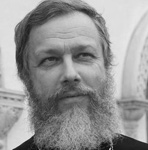 Kirill Kaleda, born 1958, is rector of the church of Russian New Martyrs and Confessors at the Butovo polygon, the principal place of mass executions and burials of the victims in the Moscow region. Father Kirill devotes himself to the study of the new martyrs of the Russian Orthodox Church and to assuring that the victims of the atheist soviet regime are not forgotten.
Kirill Kaleda, born 1958, is rector of the church of Russian New Martyrs and Confessors at the Butovo polygon, the principal place of mass executions and burials of the victims in the Moscow region. Father Kirill devotes himself to the study of the new martyrs of the Russian Orthodox Church and to assuring that the victims of the atheist soviet regime are not forgotten.
Martyrs of the Russian Orthodox Church in the Twentieth Century. The Butovo Polygon
The paper makes a parallel between the persecutions of the Church in the age of the ancient martyrs and in the twentieth century in Russia. Particular attention will be given to the years of the “great terror”, 1937–1938, the firing polygon in Butovo, the background and number of the victims on account of their faith in Christ, the discovery of the polygon in the 1990s, the building of the church and civil monument.
+ John Stroyan of Warwick
Bishop John was first drawn to the riches of Orthodoxy when studying at the Ecumenical Institute, Bossey , in 1982, where, through the lens of Rubliev’s Icon of Hospitality, the Holy Trinity, he studied the notion of perichoresis in the Orthodox tradition, under the tutorship of one who is now the Patriarch of Romania, Daniel. Since then, he has written papers on Hesychia in the Orthodox tradition and on the Theology of Iconography. He has been a friend and regular visitor of the Holy Monastery of St John the Baptist in Essex over the last 25 years and has been greatly enriched by the lives and writings of St Silouan of Athos and his disciple, Fr Sophrony, the founder of the Monastery. He has visited several monasteries, Vatopedi, Karakalou and St Paul’s, and a skete, Prodromou, on the Holy Mountain. His studies of the Jesus Prayer have led him also to the Holy Monasteries of Moldavia, and the work of Paisius Velichkovski in popularising the Jesus Prayer in the 18th century.
Since 2006 he has been a member of the International Theological Commission for Anglican- Orthodox Theological Dialogue. For this he has contributed papers on Repentance and Holiness and on Sacrifice, Salvation and Community towards the publication of the Commission’s recent report In the Image and Likeness of God: A Hope-Filled Anthropology. As part of the Commission, he has been much enriched by his experience of the Orthodox Church in Crete, in Albania and Serbia. He has also spent time in Russia, visiting the Patriarchate and monasteries in Russia.
He has visited regularly the Holy Lands building relationships with Eastern and Orthodox Churches there. In 2007, he visited Syria, on behalf of the Archbishop of Canterbury, spending time in Damascus, in Aleppo and in Hasakeh, meeting with Christian – and other faith – leaders there.
Lidya Golovkova
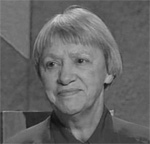 Lidya Golovkova, a graphic artist by training, from 1994 teaches at the Department of contemporary history of the Russian Orthodox Church of the Orthodox St Tikhon University. Her field of studies includes the martyrs and confessors of the twentieth century, repression, the history of prisons and concentration camps in the USSR. She has conducted research on the papers of those condemned for religious motives and on the places of mass execution. She has collaborated in publications on the trial of Patriarch Tikhon and on an encyclopedic dictionary of new martyrs and confessors in Kazakhstan.
Lidya Golovkova, a graphic artist by training, from 1994 teaches at the Department of contemporary history of the Russian Orthodox Church of the Orthodox St Tikhon University. Her field of studies includes the martyrs and confessors of the twentieth century, repression, the history of prisons and concentration camps in the USSR. She has conducted research on the papers of those condemned for religious motives and on the places of mass execution. She has collaborated in publications on the trial of Patriarch Tikhon and on an encyclopedic dictionary of new martyrs and confessors in Kazakhstan.
The Testimony of Love and Mercy of St Elizabeth Feodorovna
The human and spiritual figure of great duchess Elizabeth Fedorovna, wife of great duke Sergej Aleksandrovič. After the assassination of her husband Elizabeth founded the monastic community of Martha and Maria, in which the nuns united the striving of a spiritual life with service to the needy. After the revolution Elizabeth was arrested and killed together with the nun Barbara on 18 July 1918. In 1992 the two were canonized by the Russian Orthodox Church among the neo-martyrs and confessors. In particular, her last days will be examined on the basis of archival documents and findings at the place of martyrdom.
Konstantiv Sigov
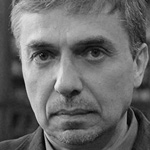 Konstantin Sigov (Kiev 1962) teaches history of theological and philosophical ideas at the Mohyla Academy State University in Kiev and directs the Center of European Humanities Research. In 1992 he founded the cultural and publishing association (Spirit and Letter (Dukh i Litera), of which he is the director. Its publishing projects have been the basis for a network of contacts with the most important European schools of thought and which brought to Kiev scholars and philosophers uh as Paul Ricœur, Reinhard Kozellek, Arvo Pärt, Georges Nivat, and others. Konstantin Sigov has published translations of the works of Patriarch Bartholomeos I, cardinal Walter Kasper, archbishop Rowan Williams, Enzo Bianchi, Michel van Parys, and of fundamental documents of the ecumenical dialogue between Catholics and Orthodox. Since 2000 he has organized every year the international ecumenical forum Dormition Readings (Uspenskie Čtenija) and publishes its Acts. He is the author of over fifty studies in philosophy, theology, and history of culture, published also in Italy, France, Germany, United States, England, and Sweden. He has held lectures at the Sorbonne, at the Universities of Oxford, Stanford, Rome, geneva, Louvain, and others. The French Ministry of Education has named him Chevalier dans l’Ordre des Palmes Academiques.
Konstantin Sigov (Kiev 1962) teaches history of theological and philosophical ideas at the Mohyla Academy State University in Kiev and directs the Center of European Humanities Research. In 1992 he founded the cultural and publishing association (Spirit and Letter (Dukh i Litera), of which he is the director. Its publishing projects have been the basis for a network of contacts with the most important European schools of thought and which brought to Kiev scholars and philosophers uh as Paul Ricœur, Reinhard Kozellek, Arvo Pärt, Georges Nivat, and others. Konstantin Sigov has published translations of the works of Patriarch Bartholomeos I, cardinal Walter Kasper, archbishop Rowan Williams, Enzo Bianchi, Michel van Parys, and of fundamental documents of the ecumenical dialogue between Catholics and Orthodox. Since 2000 he has organized every year the international ecumenical forum Dormition Readings (Uspenskie Čtenija) and publishes its Acts. He is the author of over fifty studies in philosophy, theology, and history of culture, published also in Italy, France, Germany, United States, England, and Sweden. He has held lectures at the Sorbonne, at the Universities of Oxford, Stanford, Rome, geneva, Louvain, and others. The French Ministry of Education has named him Chevalier dans l’Ordre des Palmes Academiques.
A Community under Persecution. Father Alexander Glagolev (1872-1937)
The life of witnesses and the way of martyrs are the criteria for a new critical look at the martyrology of the twentieth century. The self-awareness of an entire host of anonymous witnesses to truth is expressed lucidly in the words of the last rector of the Theological Academy of Kiev, the priest Aleksandr Glagolev, that he pronounced during his interrogations in 1937: “Only then will the sufferings of Christians resemble Christ’s sufferings and will be salvific for those who suffer when these in their sufferings will be able to preserve the true faith and a firm love of the heavenly Father… and will be able to maintain fraternal love for their neighbors, not excluding their enemies”.
Through a reconstruction of the life of the new martyr Aleksandr Glagolev and of his son, the holy righteous father Aleksej Glagolev (†1972), and of the community gathered around them, the paper attempts to discover how the martyrs themselves saw their path as a way of love and communion. “The most important thing in martyrdom is not blood, but unchanged and unchanging love” (metropolitan Anthony Bloom). Without love, there is no witness to the truth. The criterion of truth is the “law of love”.
Tamara Grdzelidze
 Tamara Grdzelidze is a graduate of Tbilisi University in Georgia, St Vladimir’s Theological Seminary in the United States, and Oxford University in the United Kingdom. In Georgia she did research in Georgian Hagiography at Shota Rustaveli Institute of Georgian Literature, as well as taught Georgian language and literature at school. From January 2001 through December 2013, Grdzelidze served in Geneva, Switzerland, as a programme executive for the WCC Commission on Faith and Order, which coordinates dialogue among Christian leaders on matters related to theology, doctrine and the nature of the church. She describes her experience of inter-church and inter-cultural dialogue while at the WCC as “a school of international relations” in itself. In 2014 she was appointed by the Ministry of Foreign Affairs of Georgia Ambassador of Georgia in the Holy See (Vatican). Among the gifts she presented to Pope Francis was a copy of the bookA Cloud of Witnesses: Opportunities for Ecumenical Commemoration, a WCC publication which she co-edited in 2009 with Br. Guido Dotti, member of the Monastic Community of Bose. She published widely on Georgian hagiography, Georgian church history, orthodoxy and modern issues, ecclesiology, hermeneutics, inter-confessional dialogue. Among her publications: The limits of the Church: Essays from Orthodox Theologians on Ecumenism, ed. Tamara Grdzelidze, Tbilisi 2000; Georgian Monks on Mount Athos: Two Eleventh Century Lives on the Hegoumenoi of Iviron (2009); Reading the Gospels with the Early Church: A Guide, ed. Tamara Grdzelidze Geneva 2013.
Tamara Grdzelidze is a graduate of Tbilisi University in Georgia, St Vladimir’s Theological Seminary in the United States, and Oxford University in the United Kingdom. In Georgia she did research in Georgian Hagiography at Shota Rustaveli Institute of Georgian Literature, as well as taught Georgian language and literature at school. From January 2001 through December 2013, Grdzelidze served in Geneva, Switzerland, as a programme executive for the WCC Commission on Faith and Order, which coordinates dialogue among Christian leaders on matters related to theology, doctrine and the nature of the church. She describes her experience of inter-church and inter-cultural dialogue while at the WCC as “a school of international relations” in itself. In 2014 she was appointed by the Ministry of Foreign Affairs of Georgia Ambassador of Georgia in the Holy See (Vatican). Among the gifts she presented to Pope Francis was a copy of the bookA Cloud of Witnesses: Opportunities for Ecumenical Commemoration, a WCC publication which she co-edited in 2009 with Br. Guido Dotti, member of the Monastic Community of Bose. She published widely on Georgian hagiography, Georgian church history, orthodoxy and modern issues, ecclesiology, hermeneutics, inter-confessional dialogue. Among her publications: The limits of the Church: Essays from Orthodox Theologians on Ecumenism, ed. Tamara Grdzelidze, Tbilisi 2000; Georgian Monks on Mount Athos: Two Eleventh Century Lives on the Hegoumenoi of Iviron (2009); Reading the Gospels with the Early Church: A Guide, ed. Tamara Grdzelidze Geneva 2013.
Martyrology in the Twentieth Century: Orthodox Church of Georgia
The paper reconstructs the story of the Georgian martyrs (mainly clerics, but also laypeople) who gave witness in defense of justice and of the rights of Church in the first years of the Soviet regime in Georgia (established in 1921). Their recent canonization and acknowledgment as martyrs by the Orthodox Church of Georgia (though they do not correspond to the category of “classical martyrdom” in odium fidei) constitutes an significant event. The speaker is convinced that the act of remembering can be a source of reconciliation and that history changes only by establishing new relations with the past, by willingness to remember not for the sake of remembering but for the sake of making peace. The new Georgian martyrs witnessed to Christ up to the death, they stood up as rivals to the existing political system causing injustice. In the act of their canonisation by the Orthodox Church of Georgia we can see a good balance between the national interests and struggle against injustice and violation of the human dignity, a way of restoring the “brokenness” of the Body of Christ.
Bogdan Tataru-Cazaban
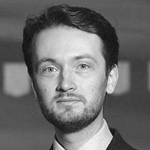 Bogdan Tataru-Cazaban is ambassador of Romania to the Holy See since 2010. He obtained a doctorate from the University of Bucharest in patristic and medieval philosophy and is a founding member of the Institute for the history of religions at the Romanian Academy. He has been a visiting professor at the Faculty of Orthodox Theology in Bucharest. His other scientific and editorial work has been in the fields of history of Christianity, Thomistic studies, French phenomenology, among others. He is the author of several books on philosophy and theology and has also translated into Romanian Saint Augustine, Boethius, Hugo of Saint Victor, Nicholas of Cusa, R. Klibansky, E. Panofsky, and E. Lévinas.
Bogdan Tataru-Cazaban is ambassador of Romania to the Holy See since 2010. He obtained a doctorate from the University of Bucharest in patristic and medieval philosophy and is a founding member of the Institute for the history of religions at the Romanian Academy. He has been a visiting professor at the Faculty of Orthodox Theology in Bucharest. His other scientific and editorial work has been in the fields of history of Christianity, Thomistic studies, French phenomenology, among others. He is the author of several books on philosophy and theology and has also translated into Romanian Saint Augustine, Boethius, Hugo of Saint Victor, Nicholas of Cusa, R. Klibansky, E. Panofsky, and E. Lévinas.
Persecution for Christ’s Sake as the bond of Communion. The Monk Nicolae Steinhardt and his Diary of Happiness
Steinhardt incarnated nobility of spirit in a world that seemed downtrodden forever and confidence in humanity in a world disfigured by hatred and resentment. He was a knight of the absolute in a society undermined by betrayals and duplicity. As a reader of Proust, Tocqueville, Chesterton, S. Weil, Valery, Bernanos, he introduced into the way the Orthodox faith, with its immutable rhythms, is lived a provocative freshness, a new style, a profoundly modern authenticity. He was converted in a communist prison and later became a monk in northern Transylvania. With Stăniloae, the great neo-patristic theologian, and Scrima, the theologian of ecumenical dialogue, Steinhart illustrates one of the facets of Romanian Orthodoxy in the twentieth century. It is no accident that John Paul II cited him during his visit to Bucharest: (Among the numerous witnesses to Christ I wish to mention the monk of Rohia, Nicu Steinhart, an extraordinary figure of a believer and a man of culture who perceived in a special way the immense common riches of the Christian Churches”.
Daniela Kalkandjieva
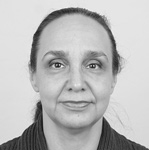 Daniela Kalkandjieva, after having studied history at the Sy Kliment Ohridski University in Sofia, received her doctorate from the Central European University in Hungary; her thesis was on the ecclesiastical and political aspects of the activity of the Moscow Patriarchate. In addition, she has done research on the Bulgarian Church, especially on the relations between religion and the public sphere, on inter-confessional dialogue, on the impact that the process of integration into Europe has on the Orthodox Church. Among her publication we may mention The Russian Orthodox Church 1917–1948, From Decline to Resurrection (London 2015) and a study on the Bulgarian Church in the years 1944–1953 (Sofia 1997).
Daniela Kalkandjieva, after having studied history at the Sy Kliment Ohridski University in Sofia, received her doctorate from the Central European University in Hungary; her thesis was on the ecclesiastical and political aspects of the activity of the Moscow Patriarchate. In addition, she has done research on the Bulgarian Church, especially on the relations between religion and the public sphere, on inter-confessional dialogue, on the impact that the process of integration into Europe has on the Orthodox Church. Among her publication we may mention The Russian Orthodox Church 1917–1948, From Decline to Resurrection (London 2015) and a study on the Bulgarian Church in the years 1944–1953 (Sofia 1997).
Martyrs and Confessors in the Bulgarian Orthodox Church under Communism
In 1989, the fall of communism in Bulgaria broke the silence on the victimhood of Orthodox clerics during the rule of militant atheists. 27 year later, however, their canonization is still an open issue. None of them has been canonically recognized as a martyr or confessor. No date in the church calendar is dedicated for the commemoration of the servants of God who had not betrayed their vocation and who had witnessed their faith through martyrdom. Meanwhile, the archives of the Bulgarian Communist Party and its security services were declassified. Their study shed new light on the destinies of hundreds Orthodox black and white clerics who remained firm in their faith despite the severe persecutions and inhuman tortures. In this regard, the paper will discuss cases of hierarchs, priests, and monks of the Bulgarian Orthodox Church, whose personal stories give us grounds to refer to them as martyrs and confessors.
At the same time, the paper raises the question: If “the blood of martyrs is the seed of Church” (Tertullian), why does the Bulgarian Orthodox Church prolong the canonization of those whose deaths in Christ can assist the revitalization of Christianity in such a post-atheist society as the Bulgarian? There is no simple answer to this question. Victimhood was not a guarantee for sainthood neither in the first centuries of Christianity, nor under communism. In the Bulgarian case, however, this relationship has been additionally complicated by the specific anti-religious policy adopted by the communists upon their seizure of power on 9 September 1944. More specifically, they did not follow the Bolshevik model of an open assault on religion. Instead, a more sophisticated strategy was adopted. It did not pursue an immediate destruction of the national Orthodox Church, but her transformation into pseudo-religious institution. In addition, the new communist rulers skillfully used the wartime situation to get rid of the most zealous and influential clerics under the slogan of fighting fascism. This and other specificities of the persecution of the Orthodox white and black clergy in Bulgaria do not allow us closely to follow the Russian experience in the canonization of Orthodox churchmen killed by the Bolsheviks in the 1920s and 1930s. The mentioned peculiarity does not mean an absence of Bulgarian Orthodox martyrs and confessors, but calls for a different approach, which to overcome the communist discourse that continues to distort the truth about the martyrdom of Orthodox clerics, by presenting them as “fascists”, “people’s enemies” or simply as criminals.
Shahe Ananyan
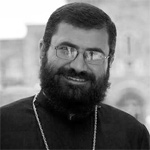 Shahe Ananyan was born on October 1, 1982 in Nor Achin (Kotayk region, Republic of Armenia). He received his primary education at the local secondary school and graduated in 1999. 1999-2003 he studied at the Vaskenyan Theological Academy. 2003-2005 studied at the Gevorkyan Theological Seminary, Mother See of Holy Etchmiadzin. In 2005 he defended his M.A. thesis: ‘’indirect sentences in four Gospels: Old Armenian version and Greek text”. On December 26, 2004 he was ordained as deacon by the Primate of the Armenian diocese in Russia and Nor Nakhidjevan, His Grace Bishop Yezras Nersissian. On September 25, 2005 he was ordained as a celibate priest (abekha) by His Grace Bishop Daron Jerejian. From July 2005 he served at the Pontifical Residence as personal Secretary and Staff Bearer of His Holiness KAREKIN II, Supreme Patriarch and Catholicos of All Armenians. In 2006-2010 he studied at Catholic University of Paris and ELCOA (Ecole des langues et des civilizations de l’Orient Ancient-Graduate School of the Languages and Civilizations of Ancient Orient), Sorbonne, Paris. In 2010 he successfully defended his thesis: “Book of Proverbs (Chapter 8): An essay of canonical-theological lecture in the Armenian Tradition”, receiving a degree of licence canonique (PhD in Catholic Theology). In 2009 he was appointed as the deputy director and editor in chief of the “Etchmiadzin” monthly. Since 2011 he is the director of newly established “Official press” department of Holy See. In 2012 he defended his thesis for the rank of Archimandrite (Vardapet), entitled “Wisdom and Bible. Interpretation and theology of the Book of Proverbs (chapters 1-9)”, receiving the rank of Archimandrite. In 2013 Fr. Shahe, with the blessing of His Holiness, was appointed as head and director of the Publishing Department of Holy See, and in 2015, as director of Inter-Church Relationships department. Since 2009 he lectures at Gevorkyan Theological Seminary as a lecturer of Old Testament Theology, and from 2012 at Yerevan State Linguistic University after V. Bryusov as a professor of Religious Studies and member of faculty. From 2013-2016 he studied at the Yerevan State University (Faculty of Philosophy and Psychology) as a PhD student in the chair of History and Theory of Philosophy, defending his PhD thesis: “Judaeo-hellenistic hermeneutics’ influence on the formation and development of early Christian religious philosophy ”. In 2016 he defended his thesis for the rank of Supreme Archimandrite (Tsayragouyn Vardapet): “The theoretical basics of the early Christian exegetical literature (I-III cc.): Historical-theological analysis of main sources”. In the same year, with the blessing of His Holiness Karekin II, His Grace Bishop Vahan Hovhannesyan, Primate of the Armenian Diocese of France, bestowed the rank of Supreme Archimandrite upon Shahe vardapet Ananyan.
Shahe Ananyan was born on October 1, 1982 in Nor Achin (Kotayk region, Republic of Armenia). He received his primary education at the local secondary school and graduated in 1999. 1999-2003 he studied at the Vaskenyan Theological Academy. 2003-2005 studied at the Gevorkyan Theological Seminary, Mother See of Holy Etchmiadzin. In 2005 he defended his M.A. thesis: ‘’indirect sentences in four Gospels: Old Armenian version and Greek text”. On December 26, 2004 he was ordained as deacon by the Primate of the Armenian diocese in Russia and Nor Nakhidjevan, His Grace Bishop Yezras Nersissian. On September 25, 2005 he was ordained as a celibate priest (abekha) by His Grace Bishop Daron Jerejian. From July 2005 he served at the Pontifical Residence as personal Secretary and Staff Bearer of His Holiness KAREKIN II, Supreme Patriarch and Catholicos of All Armenians. In 2006-2010 he studied at Catholic University of Paris and ELCOA (Ecole des langues et des civilizations de l’Orient Ancient-Graduate School of the Languages and Civilizations of Ancient Orient), Sorbonne, Paris. In 2010 he successfully defended his thesis: “Book of Proverbs (Chapter 8): An essay of canonical-theological lecture in the Armenian Tradition”, receiving a degree of licence canonique (PhD in Catholic Theology). In 2009 he was appointed as the deputy director and editor in chief of the “Etchmiadzin” monthly. Since 2011 he is the director of newly established “Official press” department of Holy See. In 2012 he defended his thesis for the rank of Archimandrite (Vardapet), entitled “Wisdom and Bible. Interpretation and theology of the Book of Proverbs (chapters 1-9)”, receiving the rank of Archimandrite. In 2013 Fr. Shahe, with the blessing of His Holiness, was appointed as head and director of the Publishing Department of Holy See, and in 2015, as director of Inter-Church Relationships department. Since 2009 he lectures at Gevorkyan Theological Seminary as a lecturer of Old Testament Theology, and from 2012 at Yerevan State Linguistic University after V. Bryusov as a professor of Religious Studies and member of faculty. From 2013-2016 he studied at the Yerevan State University (Faculty of Philosophy and Psychology) as a PhD student in the chair of History and Theory of Philosophy, defending his PhD thesis: “Judaeo-hellenistic hermeneutics’ influence on the formation and development of early Christian religious philosophy ”. In 2016 he defended his thesis for the rank of Supreme Archimandrite (Tsayragouyn Vardapet): “The theoretical basics of the early Christian exegetical literature (I-III cc.): Historical-theological analysis of main sources”. In the same year, with the blessing of His Holiness Karekin II, His Grace Bishop Vahan Hovhannesyan, Primate of the Armenian Diocese of France, bestowed the rank of Supreme Archimandrite upon Shahe vardapet Ananyan.
Martyrs as Witnesses of Communion in the Armenian Church: Holy Martyrs of Genocide and Soviet Regime in the twentieth century Armenia
The paper presents two emblematic figures of the Armenian Apostolic Church ot the XXth century: the Vardapet Komitas Soghomonyan (1869-1935), founder of the Armenian national music school and “living martyr” of the Great Armenian Genocide (1915-1923), and the Catholicos Khoren I Muradbekian (1932-1938) chief of the Armenian Church murdered by the hands of secret police agents of the Soviet regime. Both figures became collective symbols and images of the sufferings of the entire Armenian people, representing and realizing communion by their own lives (the first also by his important musical work) between generations and within the Christian conscience of the Armenians. The author is convinced that the recent proclamation of the sainthood of the Armenian new martyrs has changed and maintains to change the concept of martyrdom and Christian witness within Christian Armenian conscience. This change requires acknowledging officially the martyrdom of many other forgotten martyrs which came after and even before the Armenian Genocide (for example during the Soviet period). In this respect martyrs continue to be witness of communion, as a spiritual link which allows the Church to reappropriate her own heritage.
Aristotle Papanikolaou
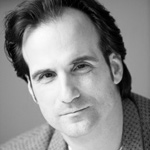 Aristotle Papanikolaou was born/raised in Chicago, Il. He is a co-founder and Senior Fellow at Fordham’s Orthodox Christian Studies Center and the Center for the Study of Law and Religion at Emory University. In 2012, he received the Award for Excellence in Undergraduate Teaching in the Humanities. He enjoys Russian Literature and Byzantine Music. His areas of expertise are Eastern Orthodox theology, trinitarian theology, and religion in public life. He is currently developing an expertise on the relation between theological anthropology, violence and virtue ethics. His on-going research interests include contemporary Orthodox theology (nineteenth and twentieth centuries) and trinitarian theology. His current research agenda relates to theological anthropology, and specifically explores the relevancy of truth-telling (confession) for understanding what it means to be human. The project is interdisciplinary and focuses on the affective effect of truth-telling; that is, the impact of truth-telling on the landscape of human emotions and desires, and how such an impact is conditioned by the presence or absence of a particular listener. He was awarded a Sabbatical Grant for Researchers from the Louisville Institute for his project The Ascetics of War, which explores the relevancy of the Eastern Orthodox notion of virtue and the role of truth-telling for undoing the affective effects of war on the human person. As a theological anthropology, he is interested in the question of how truth-telling can illuminate understandings of identity, sin, virtue, the communication of grace, a relational understanding of personhood, and the Orthodox notion of theosis. Among his publications: The Mystical as Political: Democracy and Non-Radical Orthodoxy, Notre Dame, Indiana 2012; Being with God: Trinity, Apophaticism, and Divine-Human Communion, Notre Dame, Indiana 2006; “The Ascetics of War: The Undoing and Redoing of Virtue,” in Orthodox Perspectives on War, ed. Perry Hamalis, Notre Dame Press, forthcoming; “Modes of Godly Being: Reflections on the Virtues in Eastern Orthodox Christianity”, eds. Aristotle Papanikolaou and Perry Hamalis, in Studies in Christian Ethics 26:3 (August 2013); Orthodox Constructions of the West, eds. George Demacopoulos and Aristotle Papanikolaou (New York: Fordham University Press, 2013); Orthodox Readings of Augustine, eds. George Demacopoulos and Aristotle Papanikolaou (St. Vladimir’s Seminary Press, 2008); Thinking through Faith: New Perspectives from Orthodox Christian Scholars, eds. Aristotle Papanikolaou and Elizabeth Prodromou (St. Vladimir’s Seminary Press, 2008);“Learning How to Love: St. Maximus on Virtue”, in Knowing the Purpose of Creation Through the Resurrection: Proceedings of the Symposium on St. Maximus the Confessor, ed. Bishop Maxim Vasiljević (Alhambra, CA: Sebastian Press & The Faculty of Orthodox Theology – University of Belgrade, 2013): 239-250.
Aristotle Papanikolaou was born/raised in Chicago, Il. He is a co-founder and Senior Fellow at Fordham’s Orthodox Christian Studies Center and the Center for the Study of Law and Religion at Emory University. In 2012, he received the Award for Excellence in Undergraduate Teaching in the Humanities. He enjoys Russian Literature and Byzantine Music. His areas of expertise are Eastern Orthodox theology, trinitarian theology, and religion in public life. He is currently developing an expertise on the relation between theological anthropology, violence and virtue ethics. His on-going research interests include contemporary Orthodox theology (nineteenth and twentieth centuries) and trinitarian theology. His current research agenda relates to theological anthropology, and specifically explores the relevancy of truth-telling (confession) for understanding what it means to be human. The project is interdisciplinary and focuses on the affective effect of truth-telling; that is, the impact of truth-telling on the landscape of human emotions and desires, and how such an impact is conditioned by the presence or absence of a particular listener. He was awarded a Sabbatical Grant for Researchers from the Louisville Institute for his project The Ascetics of War, which explores the relevancy of the Eastern Orthodox notion of virtue and the role of truth-telling for undoing the affective effects of war on the human person. As a theological anthropology, he is interested in the question of how truth-telling can illuminate understandings of identity, sin, virtue, the communication of grace, a relational understanding of personhood, and the Orthodox notion of theosis. Among his publications: The Mystical as Political: Democracy and Non-Radical Orthodoxy, Notre Dame, Indiana 2012; Being with God: Trinity, Apophaticism, and Divine-Human Communion, Notre Dame, Indiana 2006; “The Ascetics of War: The Undoing and Redoing of Virtue,” in Orthodox Perspectives on War, ed. Perry Hamalis, Notre Dame Press, forthcoming; “Modes of Godly Being: Reflections on the Virtues in Eastern Orthodox Christianity”, eds. Aristotle Papanikolaou and Perry Hamalis, in Studies in Christian Ethics 26:3 (August 2013); Orthodox Constructions of the West, eds. George Demacopoulos and Aristotle Papanikolaou (New York: Fordham University Press, 2013); Orthodox Readings of Augustine, eds. George Demacopoulos and Aristotle Papanikolaou (St. Vladimir’s Seminary Press, 2008); Thinking through Faith: New Perspectives from Orthodox Christian Scholars, eds. Aristotle Papanikolaou and Elizabeth Prodromou (St. Vladimir’s Seminary Press, 2008);“Learning How to Love: St. Maximus on Virtue”, in Knowing the Purpose of Creation Through the Resurrection: Proceedings of the Symposium on St. Maximus the Confessor, ed. Bishop Maxim Vasiljević (Alhambra, CA: Sebastian Press & The Faculty of Orthodox Theology – University of Belgrade, 2013): 239-250.
Truth-Telling as Martydom for the Sake of Communion
What are the constitutive elements of martyrdom such that it is distinguishable from suicide or other forms of voluntary death? Martyrdom is an event of communion constituted by a particular kind of interrelation between death, the other, and truth-telling. What constitutes death-as-martyrdom is not death per se out of belief in the promised resurrection, but a death that results from a telling of the truth and which enables communion. The author illustrates what he calls “phenomenology of martyrdom” through the phenomenology of truth-telling. The act of truth-telling which is received by someone else in truth and love becomes an event of freedom; it is a form of martyrdom and enables communion, by removing the mask that prevents communion with the other. The author raises the question whether martyrdom-as-truth-telling for the sake of communion has political implications. He is convinced that in societies of liberal democracies, despite great differences and apparent incompatibilities with the form of communion which is lived within Church, the capacity for truth-telling enables a real “politics of martyrdom”, and its sign is discernable in the visible manifestations of political communion, of forms of relationality across deep and abiding differences that constitute human beings a unique. In the concluding remarks the author suggests that the martyrs' gift to humanity is the witness that there can be no communion without martyrdom, without a death--spiritual or physical--that results from truth-telling to an other. It is only in martyrdom that love conquers fear.
Luigi d’Ayala Valva
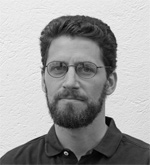 Luigi d’Ayala Valva (1976, Livorno, Italy) is a brother of the Monastic Community of Bose. After his studies of Ancient Greek history and literature in Pisa, he entered at the Monastery of Bose in 2001, where ever since he continued his research mainly in the field of patristics and monastic literature, with special reference to the ancient and byzantine tradition. Along with his scholarly and editorial activity, he charged with the formation of the novices and is member of the scientific board of the annual International Ecumenical Conference on Orthodox Spirituality, which is held in Bose since 1992, in collaboration and with the patronage of different Orthodox Churches. He is also member of the A.I.E.P. (Association Internationale Etudes Patristiques). Among his publications, the Italian translation and commentary of some of the main texts of the ancient monastic tradition: the Heavenly Ladder of St John Climacus, the Little Catecheses of St Theodore the Studite, the Sayings of the Desert Fathers. He is currently publishing the Life of St Athanasius the Athonite.
Luigi d’Ayala Valva (1976, Livorno, Italy) is a brother of the Monastic Community of Bose. After his studies of Ancient Greek history and literature in Pisa, he entered at the Monastery of Bose in 2001, where ever since he continued his research mainly in the field of patristics and monastic literature, with special reference to the ancient and byzantine tradition. Along with his scholarly and editorial activity, he charged with the formation of the novices and is member of the scientific board of the annual International Ecumenical Conference on Orthodox Spirituality, which is held in Bose since 1992, in collaboration and with the patronage of different Orthodox Churches. He is also member of the A.I.E.P. (Association Internationale Etudes Patristiques). Among his publications, the Italian translation and commentary of some of the main texts of the ancient monastic tradition: the Heavenly Ladder of St John Climacus, the Little Catecheses of St Theodore the Studite, the Sayings of the Desert Fathers. He is currently publishing the Life of St Athanasius the Athonite.
